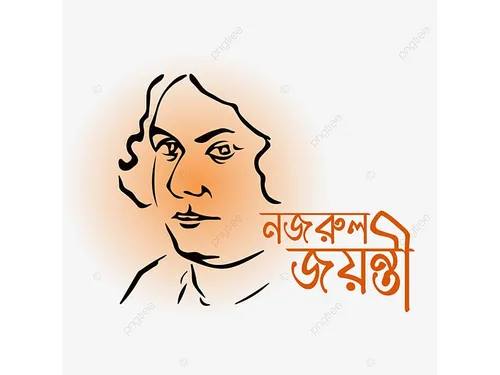
Kazi Nazrul Islam Jayanti: Honoring the Rebel Poet of Bengal
By Meenakshi G on April 30, 2025
Kazi Nazrul Islam Jayanti: Honoring the Rebel Poet of Bengal
Kazi Nazrul Islam Jayanti, observed annually on May 25th, commemorates the birth of Kazi Nazrul Islam, the national poet of Bangladesh and a towering figure in Bengali literature. Known as the “Bidrohi Kobi” or “Rebel Poet,” Nazrul’s works championed themes of rebellion, equality, and humanism, leaving an indelible mark on the cultural and political landscape of the Indian subcontinent.
Early Life and Formative Years
Born on May 25, 1899, in Churulia, a village in the Burdwan district of West Bengal, India, Nazrul hailed from a modest Bengali Muslim family. His father, Kazi Faqeer Ahmed, served as the imam and caretaker of the local mosque. From a young age, Nazrul was exposed to religious teachings and cultural traditions, which later influenced his literary works. Nazrul’s early education was rooted in Islamic studies, but his passion for literature and music led him to join theatrical groups, where he honed his skills in poetry and performance. His experiences in these groups broadened his horizons and deepened his appreciation for diverse artistic expressions.
Military Service and Awakening
In 1917, at the age of 18, Nazrul enlisted in the British Indian Army and was stationed in the Middle East during World War I. His exposure to the harsh realities of war and colonial oppression profoundly impacted his worldview. During his military service, he continued to write, producing poems and songs that reflected his growing disillusionment with imperialism and his commitment to social justice.
Literary Contributions and the “Rebel Poet”
After returning from military service, Nazrul settled in Kolkata (then Calcutta), where he immersed himself in literary pursuits. In 1922, he published his seminal poem “Bidrohi” (“The Rebel”), which catapulted him to fame and earned him the moniker “Rebel Poet.” The poem’s fiery language and defiance against oppression resonated with a populace yearning for freedom.
Nazrul’s literary oeuvre spans poetry, songs, essays, and novels, characterized by themes of rebellion, humanism, and spiritualism. He composed approximately 4,000 songs, collectively known as “Nazrul Geeti,” which encompass a range of genres, including patriotic anthems, devotional hymns, and romantic ballads.
Political Activism and Social Reform
Nazrul’s writings were not confined to artistic expression but were political activism instruments. He used his pen to challenge British colonial rule, advocate for Hindu-Muslim unity, and promote women’s rights. His magazine “Dhumketu” (“The Comet”) published articles and poems that criticized imperialism and called for social reform. As a result, he faced censorship and imprisonment, during which he penned “Rajbandir Jabanbandi” (“The Deposition of a Political Prisoner”), articulating his unwavering commitment to justice.
Later Life and Legacy
In the later years of his life, Nazrul suffered from a debilitating illness, believed to be Pick’s disease, which impaired his ability to speak and write. Despite his health challenges, his legacy continued to flourish. Following the independence of Bangladesh in 1971, Nazrul was declared the national poet and was brought to Dhaka, where he spent his remaining years until his death on August 29, 1976.
Celebrating Nazrul Jayanti
Nazrul Jayanti is celebrated with great fervor in Bangladesh and parts of India, particularly West Bengal and Tripura. The day is marked by cultural programs, including poetry recitations, musical performances, and seminars that honor Nazrul’s contributions to literature and society. Educational institutions and cultural organizations organize events to educate the younger generation about his life and works.
Conclusion
Kazi Nazrul Islam’s life and works continue to inspire generations. His unwavering stand against oppression, advocacy for social justice, and promotion of cultural harmony make him a timeless figure in South Asian history. Kazi Nazrul Islam Jayanti serves as a reminder of the power of art and literature to effect social change and the enduring relevance of his message in today’s world.